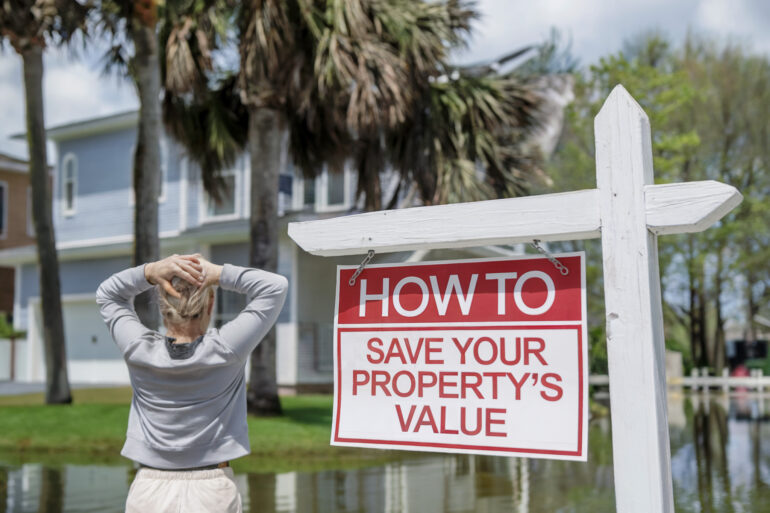How to Preserve More of Your Property’s Value After a Natural Disaster
Real estate investors embrace many uncertainties when they buy properties. Investors can review metrics, location, and other factors to increase the likelihood of making successful investments. However, some things are out of your control, including natural disasters.
Natural disasters, like hurricanes, can have an immediate impact on your property’s value. Damage from flooding, mudslides, fire, and other natural occurrences is hard to predict. If you are renting, you should check in with your tenant to see if they are okay and ask how you can help if it is needed. This gesture can entice a tenant to stay on your property or occupy another unit that you own, but more importantly, it is the right thing to do.
After checking in with your tenant, investors have several ways to protect their investments. Taking quick action can minimize the damage and help preserve most of your property’s value.
If your property has not been affected by a natural disaster, you should take this opportunity to review your insurance policy. You never know if a hurricane or another natural disaster will impact your home.
Contact the Right People
Property owners should contact local authorities right away and prioritize safety above anything else. Local governments work with the community to enable a quicker recovery.
After contacting local authorities, you should then make a call to your insurance company. Insurance companies offer financial protection for real estate investors, and you should see if your policy covers the natural disaster that took place. Some insurers require homeowners and investors to take out flood insurance or a specific policy related to natural disasters. Other insurers offer more comprehensive coverage, but you must review your policy to see what type of coverage you have.
Let the Insurance Company See Your Property’s Condition
Some investors may contact their insurance companies and make repairs before the insurance company arrives. However, making quick repairs can reduce how much you receive. A representative from the insurance company should see what the property looked like immediately after the natural disaster.
When flipping properties, some investors make cosmetic changes to enhance the property and make it more attractive to the buyer. Investors should take the opposite approach and wait to address flaws until an insurance company can assess the property. Do not make the property any worse or better than its current condition until the insurance appraiser carries out an inspection.
The funds you receive from an insurance company can make the rest of the process more manageable from a financial standpoint. The insurance company may cover most or all the expenses you may incur to rehabilitate the property.
If your property has not been affected by a natural disaster, you should take this opportunity to review your insurance policy. You never know if a hurricane or another natural disaster will impact your home. Checking your policy to see what coverage you have and making any necessary adjustments can give you more financial protection if a disaster affects your investment.
Some insurance companies may eliminate coverage for certain disasters if the losses pile up.
Compare Restoration Companies and Contractors
Restoration companies and contractors can bring your property back to its market value conditions. Some service providers can even improve your property, so it sells for higher than its original market value.
Restoration companies and contractors remove mold, address fire damage, and rebuild homes. These service providers have varying levels of experience and success. Checking online reviews and reaching out to other investors in your area can lead to good recommendations.
It is important to work with a contractor whom you can trust and who is approved by your insurance company. This process will take time, and some projects take multiple years. Any small hiccups you experience during the early stages can be the precursor to more issues in the future. Restoration companies and contractors that communicate in a timely manner and have provided great work for past clients tend to be more trustworthy.
Know How You Want to Proceed with the Property
When a natural disaster impacts your property, your property will eventually get repaired, but what happens after the restoration is complete?
Real estate investors should consider if the property is worth the risk and how they want to profit from their investment. Some investors will happily rent out their property again after restoration services are complete.
However, investors may have to raise cash flow to generate the same return on their investment. Insurance companies are likely to raise their premiums after a property is affected by a natural disaster. If the insurance company charges an additional $100/mo, you should raise your rent by $100/mo to compensate, if you feel it is feasible. Investors must consider if tenants in the area can afford the higher rent.
Investing in safety features for your home to minimize potential damage can help you protect your investment before a natural disaster strikes.
Another risk looms over real estate investors. Some insurance companies may eliminate coverage for certain disasters if the losses pile up. For instance, two insurance giants stopped offering insurance in California due to the increase in wildfires and rising construction costs.
Some investors can increase their rental income by holding onto the property. Investors who feel this way may opt to upgrade their properties. Renovating the kitchen and bathroom leads to the highest property appreciation. Making these fixes during the restoration process can help investors command higher rent and home values.
However, other investors may want to abandon the property, especially if insurance won’t cover the costs. Walking away from a property and selling it at a discount can sometimes be more profitable than restoring the property.
Investors looking to get out of the property should consider their time horizons and market trends. Rising interest rates make it more difficult for investors to take a long-term approach if they want to sell their property before a future natural disaster takes place. Higher interest rates can reduce demand and cause housing prices to decrease.
An investor who can wait 20-30 years before selling a property has more time to recover from a slowing economy. These investors can continue to rent the property once it is fully repaired.
Real estate investors must be prepared for many scenarios. Their investments can yield incredible returns and tax breaks. However, it is important to consider which natural disasters take place in your area and how they could affect your real estate investment portfolio. Investing in safety features for your home to minimize potential damage can help you protect your investment before a natural disaster strikes.








